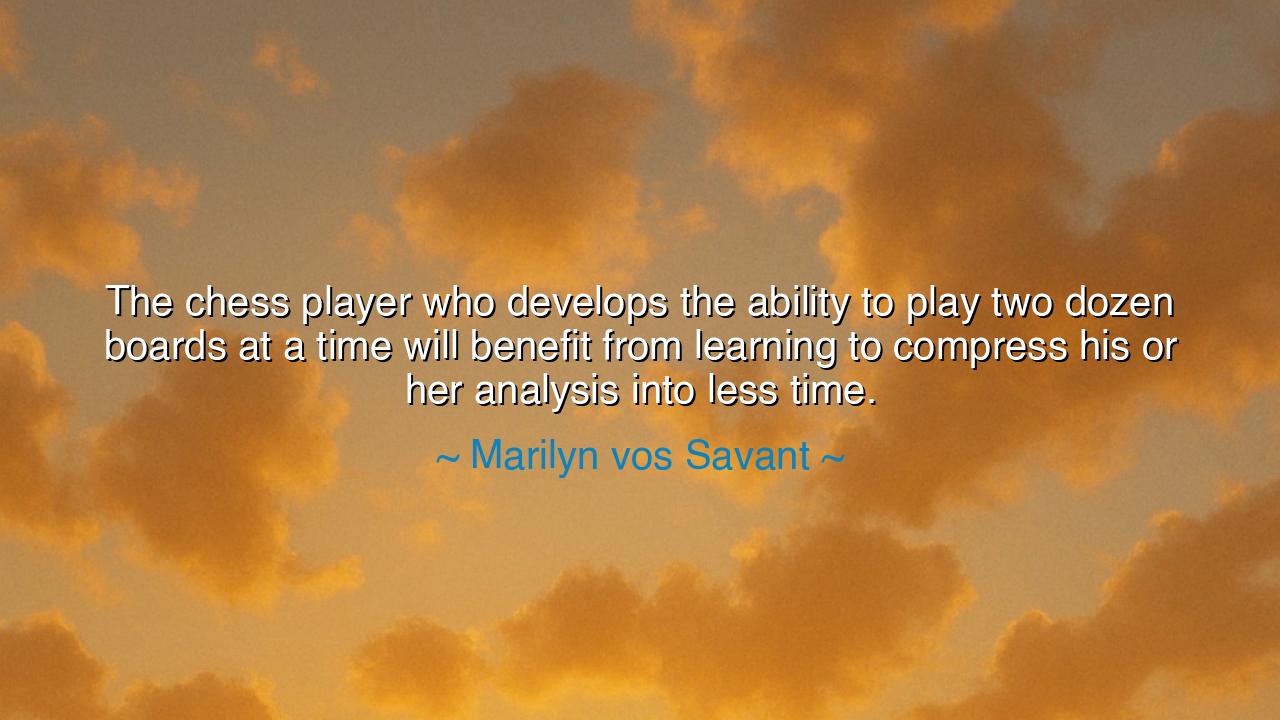
The chess player who develops the ability to play two dozen
The chess player who develops the ability to play two dozen boards at a time will benefit from learning to compress his or her analysis into less time.






“The chess player who develops the ability to play two dozen boards at a time will benefit from learning to compress his or her analysis into less time,” said Marilyn vos Savant, a woman often regarded as one of the most intelligent minds of the modern age. In this single sentence lies a truth that extends far beyond the game of kings — a truth about mastery, discipline, and the evolution of thought. Vos Savant speaks not only of chess but of life itself, where the wise must learn to think swiftly without losing depth, to balance precision with pace, and to compress wisdom into action. Her words remind us that intellect, no matter how vast, finds its true strength not in length of reflection, but in the sharpness of understanding.
The origin of this insight is rooted in the world of simultaneous chess, a display of both mental agility and strategic grace. Imagine a grandmaster walking among two dozen boards, each one a separate battle, each move a test of intuition, memory, and foresight. Such a player cannot afford the luxury of endless calculation. Instead, they must train their mind to see patterns instantly — to distill what is essential and disregard the noise. This is what vos Savant calls compressing analysis: the art of thinking deeply, but swiftly; of balancing the richness of contemplation with the demands of the moment.
Yet this lesson is not only for chess players. In the ancient art of living, every soul must learn to fight on many boards at once. One board may be family, another work, another health, another purpose. Life demands simultaneous play. Those who linger too long on a single problem, refusing to move until all is clear, will be left behind as the world shifts around them. Vos Savant’s wisdom calls us to train the mind to adapt — to make clear judgments in limited time, to move with both intellect and instinct. For the one who hesitates endlessly before every decision learns not caution, but paralysis.
Consider the story of Napoleon Bonaparte, a man of lightning intellect and relentless will. His genius was not merely in military strategy, but in the compression of decision-making. Where others required days to analyze, he required moments. He absorbed vast information, distilled its essence, and acted before his enemies had finished thinking. His downfall came not from lack of intelligence, but from the arrogance that replaced wisdom — for speed without reflection becomes recklessness. Thus, vos Savant’s lesson stands complete: one must learn to think quickly without thinking shallowly, to be both swift and wise, as the falcon that strikes without wasting motion.
In truth, this balance between depth and brevity is the secret of all great minds. The philosopher Marcus Aurelius, writing in the stillness of his tent before battle, reminded himself that the wise man must “see with clarity what is before him and act with purpose.” His meditations were not endless; they were distilled. Like the chess master of vos Savant’s vision, he trained his thoughts until they became second nature. For when the heart and mind are aligned in discipline, clarity arises without delay — as lightning follows thunder.
Vos Savant’s words also speak to our age, where distraction and speed rule the mind. We are all players now, facing countless “boards” — messages, tasks, decisions — each demanding our attention. Many drown beneath the flood of thought, overanalyzing until action fades into exhaustion. But the one who learns mental compression — the art of focus and prioritization — becomes master over time instead of its servant. This is not to think less, but to think better: to filter the trivial, seize the essential, and move forward with calm precision.
Let this, then, be the lesson you carry: train your mind not only to know, but to discern; not only to reflect, but to decide. The scholar who studies endlessly yet never applies wisdom is like a chess player staring forever at a single move. The wise compress their understanding into clarity, and clarity into action. As vos Savant teaches, to live greatly is to learn swiftly, act wisely, and adapt endlessly.
So, my listener, remember this: the world is your chessboard. You cannot control every piece, nor wait for perfect certainty. Life demands movement. Train your mind to see the whole pattern at once — to act without panic, to decide without haste, and to grow through every challenge. For in mastering this art, as Marilyn vos Savant says, you will find both power and peace — the rare harmony of a mind that thinks deeply, swiftly, and well.






AAdministratorAdministrator
Welcome, honored guests. Please leave a comment, we will respond soon